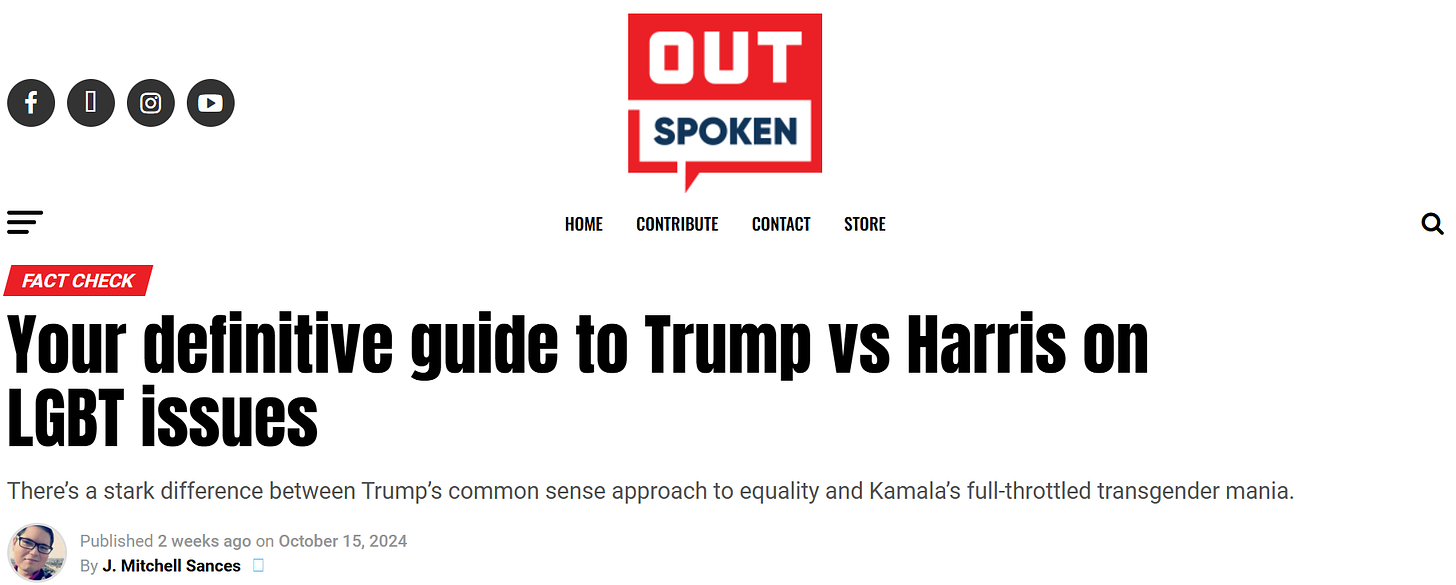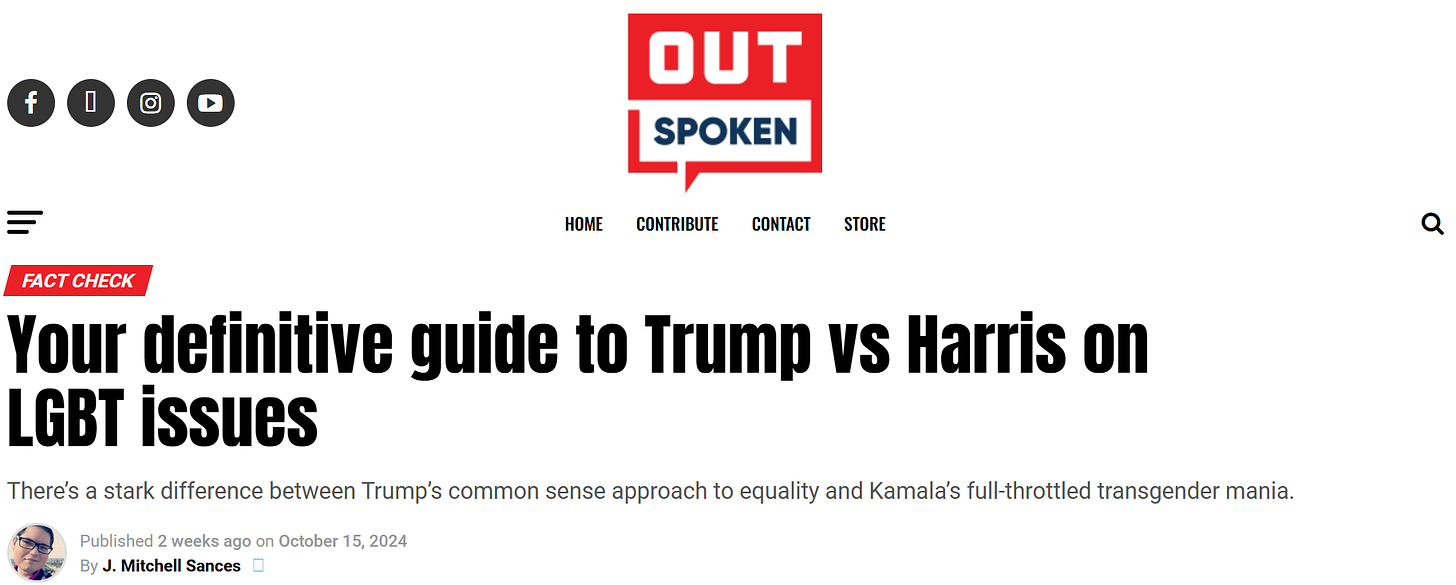Sam Harris Abuses Logic: What He Gets Wrong About a Trump Presidency, and Why DNC Fear-Mongering Needs to Stop
In a recent debate with Ben Shapiro, Sam Harris stubs his toe on every point he tries to make about Trump. Let's look at this rationally.
By Someone Who Has No Intention of Letting Bias Shape the Narrative
Sam Harris’s critique of Trump’s potential second presidency is riddled with logical fallacies that undermine the clarity of his argument. He employs Post Hoc Ergo Propter Hoc, implying that Trump’s previous tenure directly causes today’s divisiveness without acknowledging the influence of current policies. This fallacy disregards recent political changes, instead attributing all instability to Trump’s prior leadership. Harris’s reliance on Hasty Generalization casts the entire GOP under Trump as a “cult of personality,” failing to differentiate the diverse beliefs within the party that focus on policy rather than Trump’s persona. His use of Ad Hominem deflects from Trump’s tangible policy achievements by emphasizing Trump’s character flaws. At the same time, a False Dichotomy sets up a misleading binary between “normal” Democrats and an extreme GOP, ignoring shifts within both parties. Harris’s Appeal to Fear suggests catastrophic outcomes from Trump’s return, overlooking constitutional checks that curb executive power. Cherry Picking further skews his argument, as Harris selectively ignores recent evidence complicating the narrative around January 6. Lastly, Harris’s Slippery Slope suggests that reelecting Trump would erode democracy, overlooking the robust safeguards within the U.S. system that prevent such an authoritarian slide. Each of these fallacies reflects a narrative approach rather than a balanced analysis, detracting from a nuanced view of the issues at hand.
In the ongoing cacophony of election rhetoric, Sam Harris has offered up a view on Donald Trump that’s as predictable as it is incomplete. From the vantage point of reasoned analysis, Harris’s case crumbles under its omissions, selective reasoning, and outright logical inconsistencies. While Harris is a respected voice in many circles, his depiction of Trump’s potential second term as an existential threat is rooted not in a balanced examination of facts but in a narrative fixed on Trump as the “character”—a bogeyman conjured to distract from policy realities and strategic implications.
It’s time to dissect the flaws in Harris’s argument with clarity and precision. As any careful scientist would, we’ll examine each of his positions, expose his assumptions, and reveal how a more comprehensive analysis might shift our understanding.
The “Dangerous Cult Leader” Narrative
Sam Harris’s Position: “The spectacle of a sitting president refusing to commit to a peaceful transfer of power, culminating in an attack on the Capitol, remains the most shocking violation of political norms to occur in my lifetime.”
At the heart of Harris’s objection to Trump lies this singular view: Trump, he argues, is uniquely dangerous, a “cult leader” who disrupts democracy itself. This portrayal of Trump as a quasi-apocalyptic figure requires close reading, mainly as new evidence has surfaced challenging the simplistic narrative surrounding January 6. We now have substantial grounds to question the one-dimensional interpretation Harris promotes. Emerging evidence supports that agent provocateurs were likely planted within the crowd, and footage showing police officers moving barricades out of the way and, in some cases, actively facilitating entry or standing by with doors open, nearly welcoming the crowd. Harris’s account glosses over these critical details to preserve the image of Trump as the lone architect of the chaos of January 6.
Harris’s reasoning also falls prey to the Cherry Picking Fallacy—focusing only on facts that support his view while disregarding other contributing factors - for example, the DNC messaging of “zero” election fraud despite evidence of some election fraud. It is, quite simply, a biased selection of data. Furthermore, the notion that Trump’s presence inherently undermines democratic stability doesn’t account for the reality of American political resilience. We’re dealing with a system that is far from fragile; it has proven itself capable of withstanding extreme pressures and maintaining continuity. By overlooking the strength of constitutional safeguards, Harris’s argument loses its rational grounding.
By casting Trump as a would-be dictator, Harris is also acting as the very polarizing agent he says he despises in Trump.
The Rainbow-Colored Elephant in the Room
While not explicitly addressed in the debate, the left has completely polarized their following with fear of death and destruction to anyone who is not cis-hetero in the matters of gender identity and sexual orientation. Harris’ Appeal to Fear (Argumentum in Terrum) is in keeping with this practice, and it has terrified the younger generation of liberals. They should see this important article: Your definitive guide to Trump vs Harris on LGBT issues (See the list of bullet points below, at this article's end).
Ben Shapiro’s Response: Shapiro, a polar opposite in political ideology but more aligned in logical rigor, countered Harris’s stance in their recent debate: “We have a robust constitutional system with checks and balances. Even if you fear Trump’s rhetoric, his actual impact on the system was limited by institutional safeguards.” Shapiro’s response underscores what Harris ignores: America is built to withstand polarizing leaders. Fearing that a single figure could collapse our institutions reveals more about Harris’s biases than it does about Trump.
Holding Trump Accountable for Current Woes
Sam Harris’s Position: “Whatever you think of Trump, even if you think he's great, you can't deny that he brings out the worst in us. He brings out the worst in both his friends and his enemies.”
This assertion—that Trump alone is responsible for ongoing discord—smacks of the Post Hoc Ergo Propter Hoc Fallacy. It assumes that because Trump previously served as president, he must be the cause of any continued political or social strife. But here’s the reality Harris is missing: Trump has not occupied the Oval Office for nearly four years. Meanwhile, divisiveness and unrest have escalated—not due to Trump’s absence or ghostly influence, but arguably due to actions taken by the current administration.
Shapiro’s blunt response cuts through the noise: “In 2024 what I see is an administration that has produced a world that is on fire in a myriad of ways, has produced 40-year highs in inflation, [and] has not calmed the waters.” The implication is clear: Harris’s focus on Trump’s lingering “influence” overlooks the sitting administration's active role in the nation’s current problems. Blaming Trump is an exercise in deflection, not analysis.
Focusing on Character Over Policy
Sam Harris’s Position: “For all its flaws, the Democratic Party is a normal political party, and the Republican Party is now a cult of personality, which I consider to be actually dangerous.”
Harris’s position relies on a moral condemnation of Trump’s personality—a fixation that distracts from the real question of governance: outcomes. By focusing on character, Harris neglects to address the policy achievements that many Americans point to as validation of Trump’s leadership. Under Trump, we saw foreign peace agreements brokered, economic stability, and clear, defined positions on issues that, agree or disagree, were transparently articulated and executed. This wholesale rejection of policy for personality reveals an Ad Hominem Fallacy, where Harris dismisses Trump’s impact based on perceived moral flaws alone.
Ben Shapiro, focusing on the practical outcomes, observed, “For me, the question is, were you better off in 2019, or are you better off in 2024?” By focusing on tangible outcomes over subjective interpretations of character, Shapiro exposes a significant gap in Harris’s position: that policies, not personalities, often have a lasting effect on American life.
The Role of Robert F. Kennedy, Jr. in Reshaping HHS
Now, here’s a detail Harris either overlooks or willfully ignores: Robert F. Kennedy, Jr.’s anticipated role in restructuring the Department of Health and Human Services (HHS) under Trump. Kennedy’s presence would mark a seismic shift in public health policy that would reverberate through the CDC, FDA, NIH, and, indeed, across the Executive branch. Kennedy brings a mandate for transparency, a sharp focus on reducing conflicts of interest, and a plan to confront the systemic issues plaguing public health institutions. His influence will likely create ripples far beyond HHS, reshaping the foundation of public health and medicine in America.
By omitting RFK Jr. from his assessment, Harris reveals his False Dichotomy Fallacy—assuming that a Trump administration is a monolithic force characterized only by Trump’s personality. But an administration is never just the president; it’s an ecosystem, a network of individuals, each bringing their own influence to bear. Kennedy’s role, in particular, could redefine HHS and catalyze long-overdue reforms - the need for which seems to be consistently out of Harris’ reach. Harris’s refusal to consider this nuance underscores his commitment to a narrative over a balanced view.
The Possibility of Trump Acting as a Corrective
Sam Harris’s Position: “For all its flaws, I view a normal Republican as a corrective, but I don't view Trump as a corrective to the issues within the Democratic Party.”
Harris’s refusal to consider Trump a corrective force speaks volumes about his perspective. But here’s the oversight: Trump’s mere presence could prompt necessary reflection within the Democratic Party, forcing it to confront the extremities of its policies. Harris’s position embodies a False Dichotomy—the idea that Trump represents only chaos, while a “normal” Republican would somehow restore balance. In reality, Trump’s second term could apply the pressure needed to moderate the Democratic Party’s more radical factions - and, importantly, those with allegiances to big Pharma, Big Ag, Big Chem… all of the problems we’ve been harping on for years.
By neglecting this possibility, Harris is unwilling to admit that the political spectrum might benefit from a shake-up. Ironically, this suggests a rigidity and lack of flexibility within Harris’s mindset.
Conclusion: Harris’s Narrative vs. Reality
The DNC’s—and Sam Harris’s—constant drumbeat of fear-mongering has done more to polarize America than to protect it, widening the political divide with rhetoric that paints opposition voices as existential threats rather than fellow citizens with different ideas. This relentless narrative reduces complex issues to caricatures, treating nuanced policy disagreements as moral failings or harbingers of doom. Such absolutism stokes anxiety and distrust, fragmenting the country into warring camps that see the “other side” as enemies rather than Americans with shared stakes in the nation’s success. When leaders and influencers like Harris lean into apocalyptic language, they don’t just raise political stakes—they erode the possibility of constructive dialogue and democratic coexistence, fracturing the unity essential to any functional society. If the goal is to protect democracy, then vilifying opposition and fueling public hysteria does precisely the opposite, cultivating a battlefield mentality that risks making the democratic process unsustainable.
In sum, Sam Harris’s portrayal of Trump relies heavily on fallacies: Cherry Picking, Post Hoc Ergo Propter Hoc, Ad Hominem, False Dichotomy, and Appeal to Fear. Each of these missteps works to distort the realities of a potential Trump presidency. By focusing so narrowly on Trump’s character flaws, Harris omits key elements—like constitutional safeguards, RFK Jr.’s transformative potential, and the possible recalibration of the Democratic Party—that present a fuller, more complex view.
Ben Shapiro’s counters in their debate expose these weaknesses in Harris’s argument, focusing on policy outcomes, constitutional protections, and broader implications. Shapiro’s reminder of the fundamental questions—“Were you better off in 2019 or are you better off in 2024?”—is a powerful critique of Harris’s approach. While Harris’s narrative may make for compelling storytelling, it ultimately distills complex political realities into a moral judgment that lacks analytical depth.
In the final analysis, Sam Harris’s vision of Trump as an existential threat fails to withstand a rigorous examination. His fixation on Trump’s personality obscures the broader structural, policy, and ideological factors. By opting for a narrative of fear and alarm, Harris misrepresents the potential impact of a second Trump term, leaving us with a story rather than an analysis—and in a time of national decision-making, stories alone simply won’t do.
See/read the debate yourself:
From GetOutSpoken.com…
• In 2024, Trump removed all anti-LGBT language from the Republican Party platform
• Donald Trump was the first U.S. President to enter office supporting marriage equality
• In 2024, Trump hosted a gay wedding at his Mar-a-Lago home.
• Trump’s Supreme Court outlawed workplace discrimination based on sexual orientation.
• Trump supported equal rights for gay couples way back in 2000, and never flip-flopped.
• President Trump launched a global initiative to decriminalize homosexuality.
• Trump nominated two openly gay federal judges
• Trump appointed the first openly gay Cabinet member
• No, Trump didn’t ‘ban’ transgender people from serving in the military
• Trump has vowed to expand IVF coverage for all families, including LGBTs
• Trump and Vance want to expand the child tax credit for all families, including LGBT families
s








Sam Harris is a laughable piece of shit.
The TDS sublime. Harris appears possessed by demons that actively prevent him from seeing the obvious, and expresses itself as pathological terror. Was he always like this? It is not joking or abusive to say he doesn’t seem well.